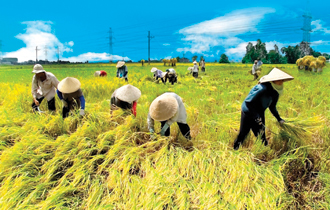|
Japan’s new
agriculture policy brings great opportunities to Vietnam
The big changes
in

SSI, a securities company for
example, has joined forces with LR Group to set up a fund to invest in
agriculture with the expected capital of $150 million. PAN’s shareholders
have agreed on the plan to raise VND650 billion worth of funds more to
implement the plan to invest in agriculture, seafood and food processing.
Despite the current big difficulties,
investors still can see a bright future for the Vietnamese agriculture,
especially when Japanese government is considering cut down the agriculture
subsidization.
What would happen?
“The opportunities are great,” said
Pham Chi Lan, a well-known economist, when asked about the prospect of the
Vietnamese agriculture production once
According to Lan, the statement by
the Japanese government to stop subsidizing the rice production means that
“The new policy would prompt Japanese
enterprises to cooperate with Vietnamese enterprises to grow Japanese rice
varieties in
“Cooperating with
Nguyen Phuong Lam, Deputy Director of
the Can Tho Branch of the Vietnam Chamber of Commerce and Industry, has
confirmed that his agency has received a lot of Japanese investors who
expressed the willingness to invest in the Mekong River Delta.
However, Lam admitted that the
foreign direct investment (FDI) in agriculture remains modest. Only 10
projects were registered in 2013, including two from
The cooperation between
Economists all have urged the
government to take actions to attract the Japanese investment into the
agriculture sector.
Like any other countries in the
world,
At present, agriculture is listed
among the conditional business fields, i.e. the investors have to meet strict
requirements to be eligible for making investment there.
Meanwhile, the Land Law with the
limitations on the agriculture land area allocated by the State is believed
to hinder the agriculture production in a large scale. The unclear investment
incentives for the investors in agriculture may also discouraged foreign
investors.
NCDT
|
Thứ Năm, 23 tháng 1, 2014
Đăng ký:
Đăng Nhận xét (Atom)
Không có nhận xét nào:
Đăng nhận xét